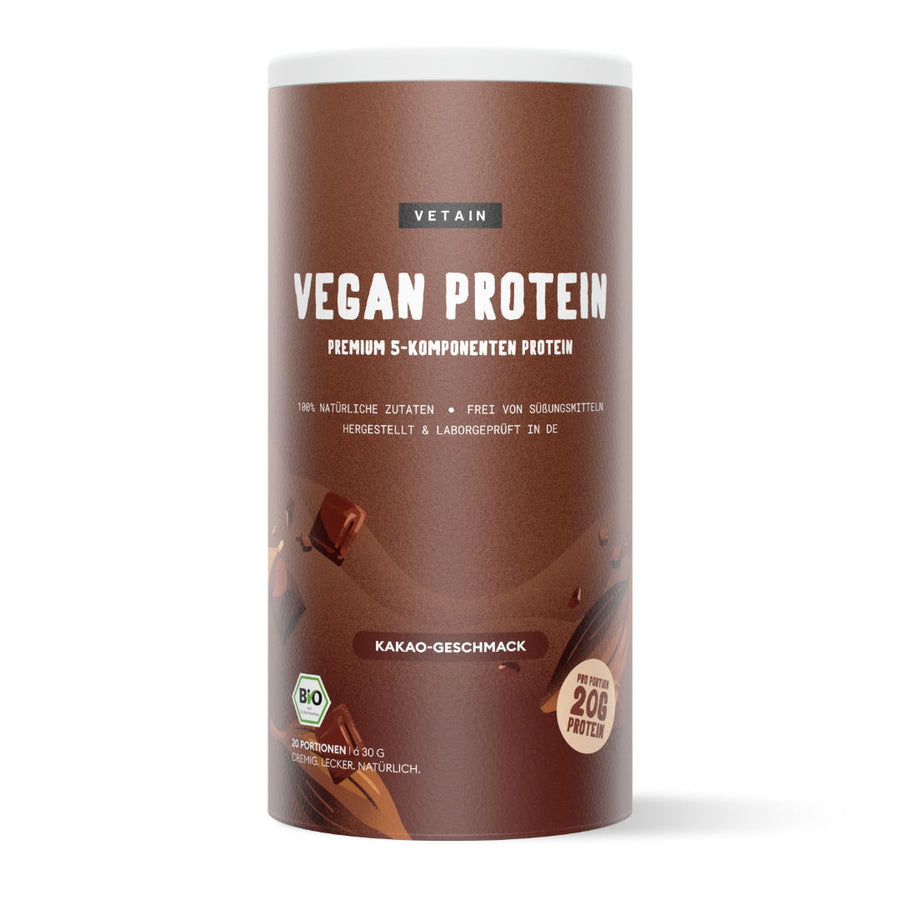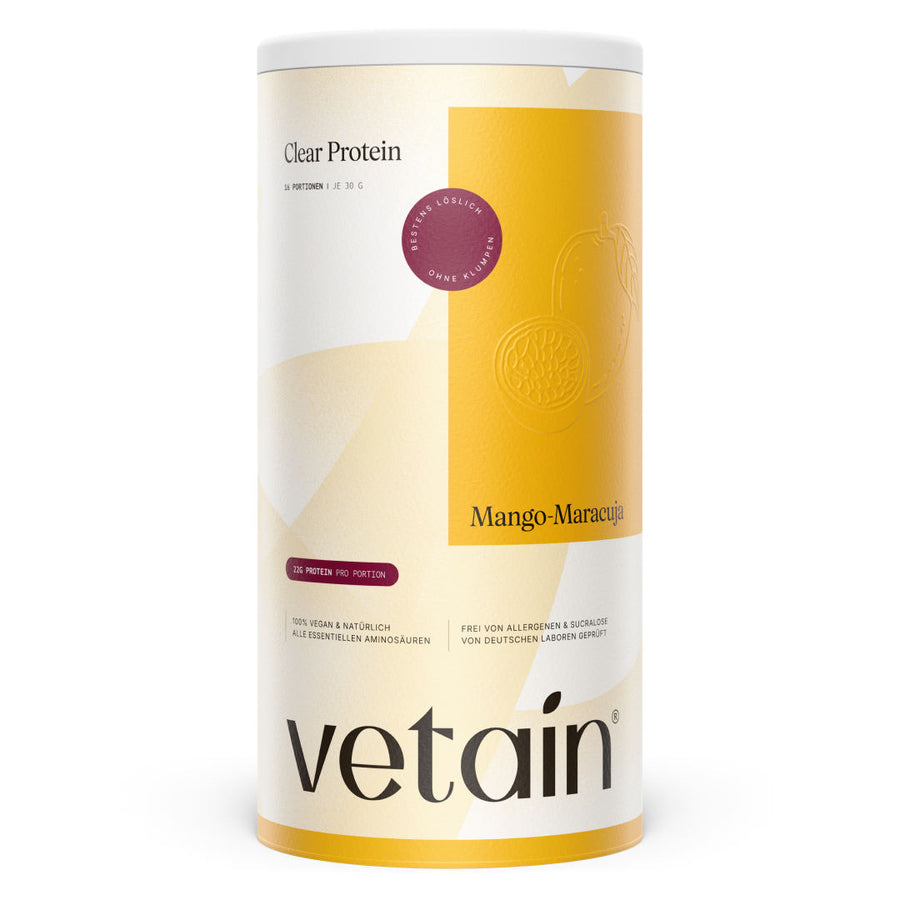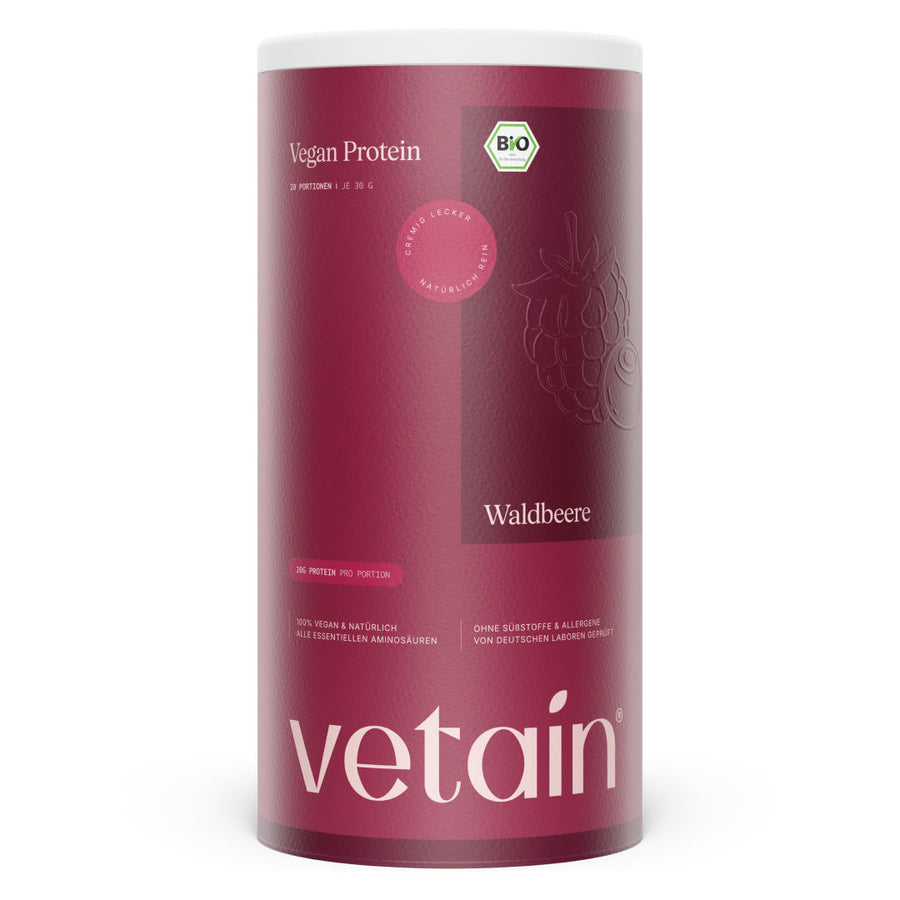The fitness industry has been debating “Vegan vs. Whey” for years. Sure, protein powder is a good thing. Whey advocates say: bioavailability is better. Vegans say: not true, plus vegan protein is often better tolerated. Whey fans shrug and reply: we’ve found otherwise. In the end, everyone can choose their own protein powder — but is there really a better or worse option? At Vetain, we’ve put together an overview for you. First of all: no shame — it doesn’t matter which protein you choose. Here we’ll try to give an unbiased assessment of vegan protein powder vs. whey. Let’s start at the beginning…
… And God said: Let there be protein powder.
By the way: when we tried to ask God to settle the “vegan protein powder vs. whey” debate once and for all, we got stuck in a phone loop and are still waiting for support to answer. We promise: if you ever contact us, we’ll get back to you.
Whey vs. Vegan Protein – what is protein anyway?
Proteins are macronutrients and part of a balanced diet. Athletes and people with active lifestyles often pay close attention to meeting their protein needs — even though it’s important for everyone. Think about it: how much protein do you really consume? Some athletes take up to 2 grams per kilogram of body weight. That’s quite a lot, especially in a society fueled by bread and pasta. Normal nutrition often isn’t enough, which is why many turn to protein powders.
Two of the most popular options are whey protein and vegan protein powder. While whey comes from cow’s milk and is considered particularly high quality, vegan protein powders are made from plant sources such as peas, rice, or hemp. These two options differ in several aspects, including biological value, amino acid profile, digestibility, and ecological footprint. Let’s take a closer look at both.
More about whey protein
Whey protein, also known as milk serum protein, is derived from cow’s milk. It is produced as a by-product of cheese-making and then filtered in several steps to obtain a pure protein concentrate. Due to its high biological value, whey protein is one of the most popular protein sources for athletes. There are different forms of whey protein, distinguished by their purity. Whey concentrate contains about 70–80% protein, while whey isolate undergoes additional filtration, reaching over 90% protein and containing almost no lactose. The purest form is whey hydrolysate, which is enzymatically pre-digested and therefore particularly fast to absorb. This makes whey a preferred choice post-workout.
However, whey can be problematic for people with lactose intolerance or milk protein allergies, potentially causing digestive issues. Many also criticize that animal welfare isn’t a priority in its production. And of course, the quality of whey is limited by the quality of livestock farming itself.
Given that animal welfare often suffers today and industrial farming practices with antibiotics and factory farming are common, it raises serious questions about how many truly healthy livestock still exist on this planet. Let’s now look at vegan protein powder.
What is vegan protein powder and is it better?
Vegan protein powder is made from plant sources and provides an alternative to animal-based protein. Common ingredients include pea, rice, hemp, or soy protein. These plant proteins are lactose-free, low in allergens, and therefore often better tolerated by people with intolerances. Each plant protein source has its own strengths and weaknesses. The biggest critique: no single plant protein offers a complete amino acid profile. Let’s take a quick detour into…
… the amino acid profile
An amino acid profile describes the composition of a protein in terms of the amino acids it contains. There are 20 proteinogenic amino acids, of which nine are essential. Essential amino acids (EAAs) — leucine, isoleucine, valine, methionine, lysine, phenylalanine, threonine, tryptophan, and histidine — must be obtained from the diet since the body cannot produce them. Branched-chain amino acids (BCAAs) are especially popular in sports: leucine, isoleucine, and valine. A complete amino acid profile ensures better protein utilization.
Back to the topic: vegan protein powder vs. whey.
As mentioned, no single vegan protein has a complete amino acid profile. Pea protein has a relatively good profile and is particularly rich in lysine. Rice protein is high in sulfur-containing amino acids like methionine but low in lysine. Hemp protein provides healthy fats but has a lower protein content. To improve biological value and amino acid profiles, blends of different plant proteins are often used. These multi-component proteins combine various sources to cover all essential amino acids. The vegan protein powder from Vetain, by the way, has a complete profile thanks to this approach!
%-split_content-%
Another advantage of vegan protein powders is their better tolerability for people with milk allergies or digestive issues. They also have a lower ecological footprint than whey, since their production requires fewer resources. And of course, no animals are kept in poor conditions.
Vegan protein powder vs. whey: the biggest differences
The main difference between plant-based and animal-based proteins lies in their biological value and protein bioavailability — the biggest dispute in the vegan protein powder vs. whey debate. Animal proteins, especially whey, contain all essential amino acids in an optimal ratio for the human body. Not least because animal bodies function similarly to humans. Structurally, whey protein is almost identical to what our bodies need.
Plant proteins, on the other hand, are often limited in one or more essential amino acids. For example, rice protein is low in lysine, while pea protein is low in methionine. By smartly combining different plant proteins, this drawback can be balanced out.
Another aspect is digestion — and we don’t just mean the digestive issues from dairy products. Animal proteins are usually digested faster, while plant proteins are digested more slowly. This can also be an advantage since plant proteins are often described as more filling. As you can see, it’s not so easy to say which is better. Regarding sustainability, however, plant proteins clearly win, as their production requires less water and farmland and emits less CO₂.
Vegan protein powder vs. whey – which choice is right for you?
The choice between whey protein and vegan protein powder depends on several factors, including personal goals, tolerance, environmental awareness, and taste preferences.
Whey protein is ideal for…
… athletes seeking a high-quality amino acid profile. Its high biological value ensures efficient utilization in the body and it usually contains all essential amino acids. Plus, whey protein is digested quickly.
Vegan protein powder is suitable for…
… people who cannot tolerate dairy or who avoid animal products for ethical or ecological reasons. It’s also a great option for those with lactose intolerance or for vegans. In terms of sustainability, plant protein clearly has the edge, as its production emits fewer greenhouse gases, requires less water, and uses less farmland. However, some plant proteins have lower biological value, which can be offset by multi-component blends.
Of course, taste also plays a role: whey protein is often creamier and more neutral, while vegan proteins can taste earthier or more plant-like depending on the source. Many protein powders also contain additives such as sweeteners or thickeners, which vary depending on the brand. Solubility matters too — whey protein usually dissolves better in water, while plant proteins can be slightly thicker in consistency.
At Vetain, we saw a real gap in the market: demand for vegan protein powder was high — also among us. For us, the question “vegan protein powder vs. whey” was a no-brainer. We, the founders of Vetain, found that conventional protein powders often caused digestive issues and skin problems.
Unfortunately, we also couldn’t find a vegan protein powder that met our standards. Products were either:
- sandy
- disgusting
- loaded with artificial flavors and additives such as sweeteners and anti-caking agents
- or all of the above.
So we thought: let’s just make our own! Many hours, days, weeks, and months later: our vegan protein powder was born.
%-product_content-%
Vetain products
At Vetain, one thing is especially important: treating ourselves and our planet the right way. We didn’t want to compromise on quality or sustainability. Even though it caused us some headaches along the way, we managed to create products we’re proud of — and even expanded our range to include toppings and vitamins.
Our focus remains on avoiding unnecessary artificial extras just to improve taste. You can always rely on the clean ingredients in our products! And for sustainability: we use as little plastic as possible. Instead, we use cardboard and, for example, don’t include scoops — after all, everyone has a tablespoon at home. That’s enough, right?
Vegan protein powder vs. whey: which protein is right for you?
That’s something we can’t answer for you. At the end of the day, you have to test it yourself, because only you know what works best for your lifestyle and body. What we can say: we can’t imagine life without protein powder anymore. It’s one of the easiest ways to meet your protein needs. The most important things to look out for when buying — whether vegan protein powder or whey — are:
- No artificial sweeteners.
- No cryptic ingredients listed only as numbers and letters (like colorants).
- For whey: grass-fed cows. The best whey comes from happy cows — and happy cows graze outdoors.
- For vegan protein: a smart mix of multiple plant protein sources. As a rule of thumb: at least two different plant types. For example, rice (a grain) and peas (a legume). A poor combo would be peas and lentils (both legumes) because their amino acid profiles are too similar to form a truly balanced ratio.
As explained, the choice between whey and vegan protein depends on many factors — including tolerance, diet, and personal goals. We won’t give you a direct recommendation here. But we hope our article “vegan protein powder vs. whey” gave you a comprehensive overview and a solid basis for making your own choice.
And honestly: it’s not like getting a dreaded tattoo on your forehead for life. You can just give it a try! Most people with strong opinions have already tried both and now defend THEIR truth. And if someone has a strong opinion without ever trying both… you shouldn’t listen to them anyway.
One last note: it should be clear by now, but “vegan whey protein” doesn’t exist. It’s either whey, or it’s vegan.





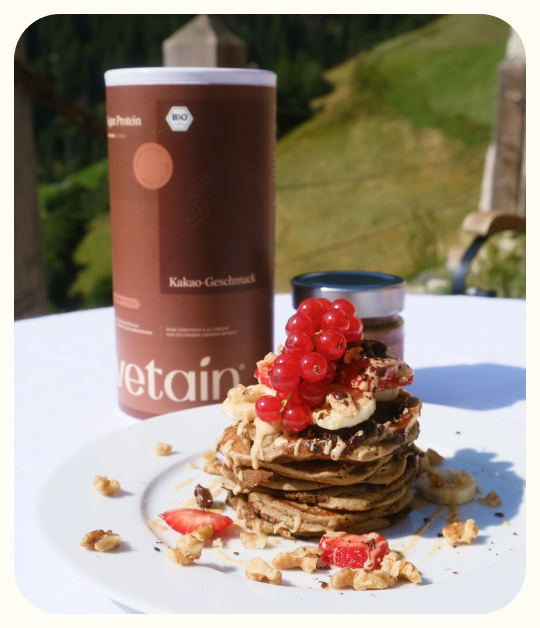


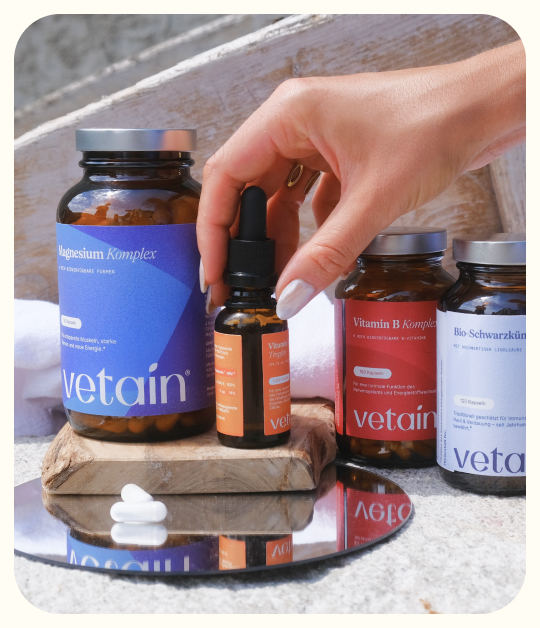






 8 Min
8 Min
 Zuletzt aktualisiert am 30.10.2025
Zuletzt aktualisiert am 30.10.2025
